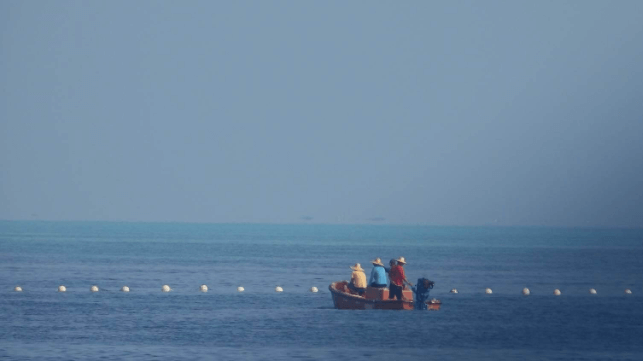Philippines Accuses Chinese Fishermen of Using Cyanide on Disputed Reef

The Philippines' fishery management agency has accused Chinese fishermen of using cyanide to pursue their catch at Scarborough Shoal, a productive and much-disputed reef off the west coast of Luzon.
Over the weekend, Philippine Bureau of Fisheries and Aquatic Resources (BFAR) spokesperson Nazario Briguera told media that Chinese fishermen "use cyanide" at Scarborough, and not just for the usual reason of stunning the fish for live capture. Briguera accused China's South China Sea fishing fleet of picking this illegal fishing method in order to "intentionally destroy [the environment] to prevent Filipino fishing boats to fish in the area." He put the value of the damages at about $18 million, though the agency has yet to carry out a thorough investigation.
Philippine Coast Guard spokesman Cmdr. Jay Tarriela told media on Sunday that there was no firm evidence yet that Chinese fishing vessels are using the cyanide method.
The Global Times, a Chinese state-owned outlet oriented towards opinion, rejected the accusation and suggested Monday that the BFAR had "groundlessly smeared" Beijing.
Cyanide fishing is used widely in Southeast Asia to capture live reef fish for the aquarium trade. It is typically an artisanal practice carried out by small operators: the cyanide is mixed and applied by hand to a stretch of reef, and it stuns and weakens any fish to make them easy to capture. It also increases the mortality rate of the fish, and it can damage the living coral. Though illegal in the Philippines and Indonesia, enforcement is very difficult. The sheer scale and remoteness of the target reefs and the opaqueness of the aquarium trade make it hard for authorities to spot the activity, either when it happens or after the fact.
BFAR's accusation followed days after a run-in between one of its patrol vessels and Chinese forces at Scarborough Shoal. The BRP Datu Tamblot was at the reef for three days on a mission to provide supplies to a flotilla of Philippine fishing vessels. During the patrol, China Coast Guard vessels maneuvered "dangerously" to block the Tamblot, according to the Philippine Coast Guard.

that matters most
Get the latest maritime news delivered to your inbox daily.
China denied this charge as well, and called the China Coast Guard's performance "law enforcement in Chinese territorial waters."
China claims sovereignty over almost all of the South China Sea, and it has occupied multiple islands within the Philippine exclusive economic zone (EEZ). Its claims were rejected by the Permanent Court of Arbitration in the Hague in 2016, but Beijing has ignored the ruling.
